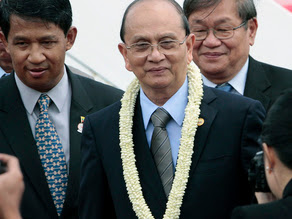[postlink]
https://burmacampaignjapanteam.blogspot.com/2012/12/aung-san-suu-kyi-to-be-honored-with.html
[/postlink]


WASHINGTON —Aung San Suu Kyi will receive the 2012 Ion Ratiu Democracy Award, Jane Harman, president and director of the Wilson Center, announced today. Suu Kyi, will be honored with the prestigious award at a symposium in Yangon, co-hosted by the Wilson Center’s Global Women’s Leadership Initiative on January 15-16, 2013.
“Aung San SuuKyi’s lifelong dedication to the cause of democracy and the Burmese people makes her the perfect recipient of this year’s Ion Ratiu Democracy Award,” said Harman. “Daw Suu is a world icon who has shown that grace and non-violence are the most powerful weapons against oppression.”
Following 15 years of house arrest as a political prisoner of the junta at the forefront of the democracy movement in Burma, Suu Kyi now heads Myanmar’s main opposition party, the National League of Democracy. She is a Nobel Peace Prize laureate and the recipient of the United States Congressional Gold Medal. Suu Kyi will receive the Ion Ratiu Award during a two-day symposium in Yangon, Myanmar titled“Women Leading Democracy Building in Myanmar: Shaping Global and Local Strategies.” This will be the first time a Ratiu Award nominee will be honored in her home country at a program that advances her cause among the people whose rights she defended and fought for.
The Ion Ratiu Democracy Award brings visibility and international recognition to the ideas and accomplishments of individuals around the world who are working on behalf of democracy. The award expresses the deep commitment to democracy of the late Ion Ratiu through his contributions as a Romanian politician as well as his interest in democratic change worldwide. Ion Ratiu (1917-2000) was the most outspoken and consistent voice of opposition to Nicolae Ceausescu, whose regime he opposed for years from London as the democratically elected leader of The World Union of Free Romanians. The Ion Ratiu Democracy Award is funded by The Ratiu Family Charitable Foundation and The Ratiu Center for Democracy.
The Global Women’s Leadership Initiative’s (GWLI) global network is the platform for both the Council of Women World Leaders, located at The Wilson Center since November 2011, and the Women in Public Service Project, launched by Secretary Hillary Clinton in partnership with the historic Seven Sisters women’s colleges, which moved to the Wilson Center in June 2012. The GWLI is a unique platform for change – connecting current and emerging women leaders, promoting the goal of 50 percent women in public service jobs worldwide, advancing inclusive policies, and bringing new research to the forefront.











